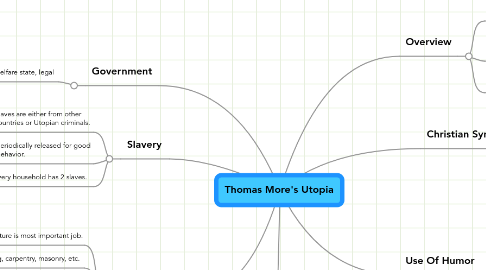Thomas More's Utopia
by Maeve Shelly

1. Everyday Life
1.1. Agriculture is most important job.
1.2. Weaving, carpentry, masonry, etc.
1.3. Everyone who is capable works, work days are shorter.
1.4. Scholars can become ruling officials. They are picked when young to be taught. Everyone else just encouraged to learn in spare time.
2. Slavery
2.1. Slaves are either from other countries or Utopian criminals.
2.2. Periodically released for good behavior.
2.3. Every household has 2 slaves.
3. Social Critique
3.1. Some of the ideasseem to be polar opposites of his beliefs and those expected of the devout Catholic.
3.2. Also the communistic life style of a Utopian shows the value that More placed on a simpler communal life, reflecting his longing for monastic duties.
4. Government
4.1. Welfare state, legal
5. Overview
5.1. Christian-humanist view of an ideal society.
5.2. More does not simply offer a theoretical view, but provides specifics for how to create this world.
5.3. Utopia offers a Christianized form of Plato's Republic.
6. Christian Synthesis
6.1. The Christian aspect of the synthesis is Christ's gospel of caring for the poor the oppressed and the downtrodden.
6.2. The Platonic Republic tradition is the Greek aspect of the synthesis.
6.3. More wrote Utopia with a comedic tone, allowing him to speak his truth while telling a deeper story.
7. Use Of Humor
7.1. Utopia means "nowhere"- title is a joke.
7.2. Group of 30 houses is called a "sty". Indicating that the British are pigs.
7.3. These names are designed to emphasise the illusory nature of the work and Raphael's last name, Hythlodaeus meaning "dispenser of nonsense" helps to discredit his words among those who get the joke.


